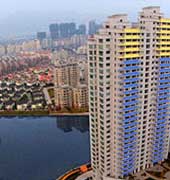Buying costs are moderate in China
How high are realtors´ and lawyers´ fees in China? What about other property purchase costs?
Transaction Costs |
||
| Who Pays? | ||
| Deed Tax | 3% - 5% | buyer |
| Transfer Fee | 0.50% | buyer |
| Stamp Tax | 0.05% 0.05% |
buyer seller |
| Real Estate Agent´s Fee | 0.50% - 3% | seller |
| Costs paid by buyer | 3.55% | |
| Costs paid by seller | 0.55% - 3.05% | |
| ROUNDTRIP TRANSACTION COSTS | 6.10% - 8.60% | |
| See Footnotes Source: Global Property Guide |
||
 How difficult is the property purchase process in China?
How difficult is the property purchase process in China?
"There is no private ownership of land in China. One can only obtain rights to use land. A land lease of up to 70 years is usually granted for residential purposes.
Foreigners who have worked or studied in China for at least a year are allowed to buy a home. Foreigners go through supervision procedures for about a week before they are allowed to buy properties in designated areas.
Ownership rules for foreigners and locals were harmonised on a national level in 2001, but the local governments implement the lifting of restrictions. The municipal authorities of Shanghai lifted the restriction on July 2001, Beijing followed on August 2002.
Foreigners cannot be landlords. Property ownership for investment by foreign companies and individuals are prohibited. Chinese living overseas and residents of Hong Kong and Macau are exempt from these restrictions.
There are two kinds of property titles:
- Use Rights - lease rights to the property.
- Free Hold - has ownership rights to the property.
It is important to hire a lawyer, especially if the buyer is not familiar with the real estate system in China.
When a property has been chosen, a down payment of CNY5,000 (US$829) to CNY30,000 (US$4,974) has to be made together with the signing of "Beijing Commodity Housing Purchase Offer". The initial payment is usually 30% of the purchase price, paid with the signing of the "Beijing Commodity Housing Pre-Sale Contract". After the registration of the contract, the outstanding balance must be paid off. Property acceptance, title transfer, and obtaining the title certificate follow.
It is the responsibility of the seller or the developer to provide the following certificates:
 State Land Use Certificate (Guoyou Tudi Shiyong Zheng)
State Land Use Certificate (Guoyou Tudi Shiyong Zheng) - Construction Land Planning Certificate (Jianshe Yongdi Guihua Xuke Zheng)
- Construction Project Planning Certificate (Jianshe Gongcheng Guihua Xuke Zheng)
- Construction Project Commencing Certificate (Jianshe Gongcheng Kaigong Zheng)
- Sales Certificate (Xiaoshou Xuke Zheng)
There are three procedures to register property, which can take around 32 days to complete.
Footnotes to Transaction Costs Table
The round trip transaction costs include all costs of buying and then re-selling a property - lawyers´ fees, notaries´ fees, registration fees, taxes, agents´ fees, etc.

 Currency:
Currency:
China uses China Yuan Renminbi. Exchange rate is at US$1=CNY7.9146 as of 23rd October 2006.
 Business tax:
Business tax:
Effective June 01, 2006, Business Tax is levied on the entire proceeds from the disposal of a residential property held by the owner for a period of less than five years (previously two years). If the property is held for more than five years, the Business Tax works like a capital gains tax. The disposal of Normal Standard Residential Properties (NSRP) held for over five years is EXEMPT from Business Tax.
 Deed tax:
Deed tax:
Deed tax ranges from 3% to 5%, depending on the location of the property.
 Transfer fee:
Transfer fee:
Service charge levied by the local real esatte bureau which is usually at 0.5% of the total consideration of the property transfer.
 Stamp tax:
Stamp tax:
Stamp tax is 0.05% for Property Transfer Documents (such as Sales contract), paid separately by buyer and seller.
 Real estate agent´s Fee:
Real estate agent´s Fee:
Negotiable.